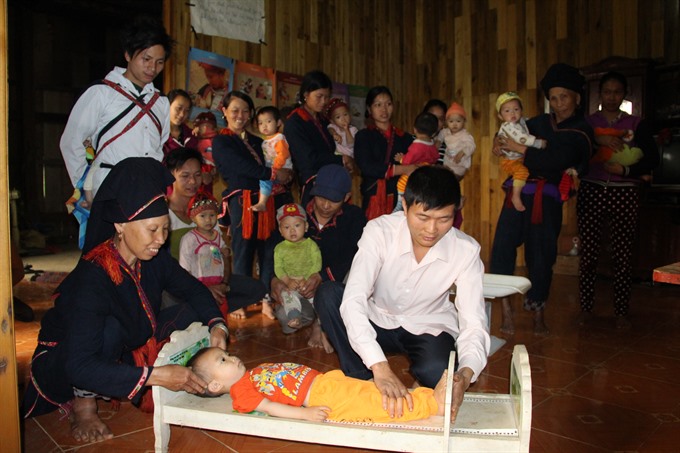 Society
Society

A new project is being carried out to combat child malnutrition among ethnic groups living in the north of the country.
 |
| Child growth monitoring in Nậm Lành Commune, Văn Chấn District, northern mountain Yên Bái Province. A new project is being carried out to combat child malnutrition among ethnic groups living in the north of the country.- Photo courtesy of SC. |
HÀ NỘI – A new project is being carried out to combat child malnutrition among ethnic groups living in the north of the country.
The Northern Mountain Integrated Child Nutrition Improvement project has been signed into effect by Save the Children in Việt Nam (SC) and World Bank (WB), targeting Yên Bái and Sơn La provinces for the period 2017-2021.
The project has a budget of US$ 2.82 million funded by the Japan Social Development Fund.
To ensure sustainable and long-lasting results, Save the Children will work with both local community authorities as well as government agencies, specifically, the Maternal and Child Health Department under the Ministry of Health and the provincial Departments of Agriculture and Rural Development.
Dragana Strinic, Country Director of SC, praised the growth Việt Nam has achieved in the last 20 years, however, she noted that the country was still struggling with child malnutrition among ethnic groups.
She stated that H’mông, Dao and Thái ethnic minorities witness “alarmingly high rate of stunted children”, with 40-50 per centof all children suffering from stunting.
“Addressing child malnutrition is extremely important at a personal level for each child, because it affects their health, brain development, life expectancy and productivity. It is also important from a socio-economic perspective in order to stop the inter-generational cycle of poverty and decrease income disparities in society,” Strinic said.
The project will adopt an integrated approach combining various interventions, such as campaigns to change behaviour, promotion of breast-feeding, improving feeding practices for infants and the young, and offering more diverse diets through the development of home gardens.
Some 142,000 people in 200 villages in the two provinces are estimated to benefit directly from the project, while the entire population of the two provinces (375,000 people) will be indirect beneficiaries.
According to Ousmane Dione, WB Country Director for Việt Nam, the project promisted solid results as it targeted 20 per cent increase in the number of infants from 0-6 months old to be exclusively breastfed, an increase of 30 per cent of pregnant women receiving maternal care (at least three check-ups during pregnancy), and developing action plans for promoting nutrition-sensitive agriculture.
A generation of children with better cognitive development and greater physical productivity will ultimately drive Việt Nam’s economy, in terms of growth and international competitiveness, he added.
Nguyễn Đức Vinh, Head of the Child Health Department, affirmed that the MoH would work closely with SC and other bodies to secure the success of the project, in order to “make sure no one is left behind". – VNS




